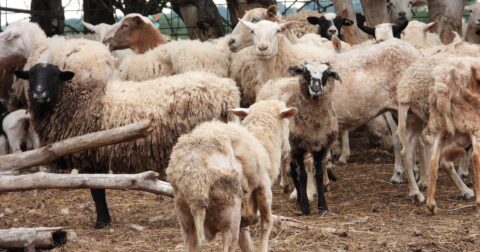Explainer
How To Explain Lab-Grown Meat Simply to People Who Aren’t Scientists
Food•10 min read
Investigation
Many of the farmed animals were found "in a severe state of neglect." The USDA, which has already given the farm $160,000, refused to comment on whether or not it would continue its support.


Words by Sophie Kevany
A Kansas farm cruelty case has shocked law enforcement and activists. Efforts to legally remove the animals from the U.S. Department of Agriculture funded owner have failed, however, while the owner’s father called the cruelty allegations “fabricated.” A second attempt to remove the animals to a sanctuary is underway, as is a fundraising effort to cover legal and other costs.
The animals were first discovered “in a severe state of neglect” by U.S. NGO, Companion Animal Protection Society (CAPS), which visited the property in late May.
Many of the 50 or so sheep and goats were emaciated, the NGO said in a press release. Other problems listed by the NGO included: the absence of food or water; decomposing carcasses; a sheep with hooves so long she could neither walk nor lie down easily; a sheep with exposed internal organs and a caged rabbit with a severe eye infection. One of the NGO photos appeared to show a goat that had died with its head in an empty trough.
Speaking to Sentient Media after visiting the farm, Tyler VanCoevern, Deputy Sheriff for Ottawa County, Kansas, said he had “not seen anything of this nature in 20 years of service.” VanCoevern confirmed that the owner of the property was charged with 10 counts of animal cruelty relating to his treatment of the rabbits, sheep, and goats.
During his initial visit, VanCoevern released animals from pens, allowing those who could walk to graze, and contacted the owner asking him to bring feed and water. VanCoevern confirmed that he had seen a sheep with overgrown hooves, another with exposed internal organs, as well as sheep and goat carcasses and bones on the property.
State attorney for Ottawa County, Richard Buck, named the suspect in the cruelty case as Kevin Daniel Vesterberg. In an email following Vesterberg’s first court appearance on June 15 Buck said that a veterinarian had visited the property to look at “the specific conditions of the animals” but did not order their removal. Called for comment, the visiting vet, David Wallace, said he did not wish to discuss the case but confirmed he was working with the sheriffs.
In a Twitter post on May 28, Buck appeared to make light of the abuse case saying: “Ah the life of a rural prosecutor; I just directed a deputy sheriff to take mug shots of goats… that is intentionally plural. #Kansas.”
Asked about the tweet Buck said it was “a comment on the irony of gathering evidence [… in] this case a ‘mug shot’ of the animal and its condition on the day in question […] I was not making light of this situation.”
A CAPS investigator said the court’s failure to remove the animals from Vesterberg was “the worst possible outcome.” No other punishments or fines were levied against Vesterberg during the June 15 court appearance. Buck indicated the case would return to court for a trial in “mid-August.”
Between 1995 and 2020, Kevin Vesterberg received almost $160,000 in subsidies from the USDA. The USDA is regularly accused of failing to protect animal welfare. One of its leading critics is US NGO, Animal Welfare Institute (AWI). Recent allegations against the USDA by AWI include failures to properly enforce animal welfare laws at poultry slaughterhouses, an Iowan puppy mill, and the Moulton Chinchilla Ranch, a breeder that supplies chinchillas for animal experimentation.
Whether there are similar cruelty cases on other USDA subsidized farms is unclear, but AWI believes it’s possible. “We don’t know of any farms in Kansas or elsewhere that receive government subsidies and have been investigated, charged, or convicted of farm animal neglect or cruelty because this information is not readily available. But I suspect there are many other examples,” said Dena Jones, AWI farm animal program director.
In a statement, the USDA said that although the “vast majority of producers make every effort to treat their animals humanely, USDA recognizes that instances of inhumane treatment do occur.” Legally, however, the statement said, under the Animal Welfare Act and Humane Methods of Slaughter Act the USDA “is specifically precluded from establishing regulations or enforcing standards at the farm.”
The statement added that: “When animals fall within our authorities, USDA acts to prevent animal cruelty. The animals in the case you mentioned do not fall within our authority. Policies for humane handling of animals consist of a combined effort of federal, state, and local authorities, as well as private industry.” Notwithstanding legal limits, the USDA said, “We strongly encourage producers to treat their livestock humanely.”
The USDA did not answer questions about whether animal abuse could result in the USDA refusing to provide further subsidies or asking farmers to return already allocated subsidy money.
Speaking on behalf of Kevin Vesterberg, his father, Virgil, told Sentient Media the animal cruelty allegations have led to Kevin selling his animals and leaving the business after 40 years of raising sheep. Asked about the photographic and written evidence against his son presented by CAPS, Vesterberg said the abuse allegations were fabricated.
Virgil Vesterberg further explained that the food and water shortages seen by CAPS were due to the animals having already eaten feed provided earlier in the day and a delay with the water delivery. The NGO, he summarized, was “making a big deal out of nothing.”
Ottawa County Sheriff Office incident reports from 2015 and 2012 indicate that Kevin Vesterberg had previously caught the attention of authorities, in one case for apparently failing to provide enough water and heat shelter for pigs, one of which died. No charges were brought. Until CAPS accidentally discovered the Vesterberg animals in May this year—during a separate puppy mill investigation—his previous incident history was unknown to the NGO.
Speaking to Sentient Media in mid-July, the CAPS investigator said new legal efforts are underway and, if successful, the animals will be transferred to the Gentle Barn farm animal sanctuary in Missouri. Legal and rescue costs could top $30,000. CAPS and Gentle Barn are both working to raise the required funds.
Midge Grinstead, Kansas state director for the Humane Society of the United States (HSUS), said she is contacted at least once a year about livestock abuse in the state, and often little is done.
“In Kansas, if the animals are considered livestock, they are rarely removed and the owner is often given extended periods of time to care for the animals. Additionally, costs for seizures can be expensive and most counties do not have the funds, manpower, or holding areas to seize animals,” she said.
HSUS animal cruelty policy director, Leighann Lassiter, added that although all 50 states offer “basic protection for livestock in their anti-cruelty laws … there are [in many states] significant obstacles to preventing cruelty and prosecuting offenders because of exemptions or exclusions in the law.”
“Animals defined as ‘livestock or farm animals’ do not suffer physical pain any less than a dog or cat and our laws should reflect an owner’s duty to provide them with humane care and treatment,” Lassiter said.